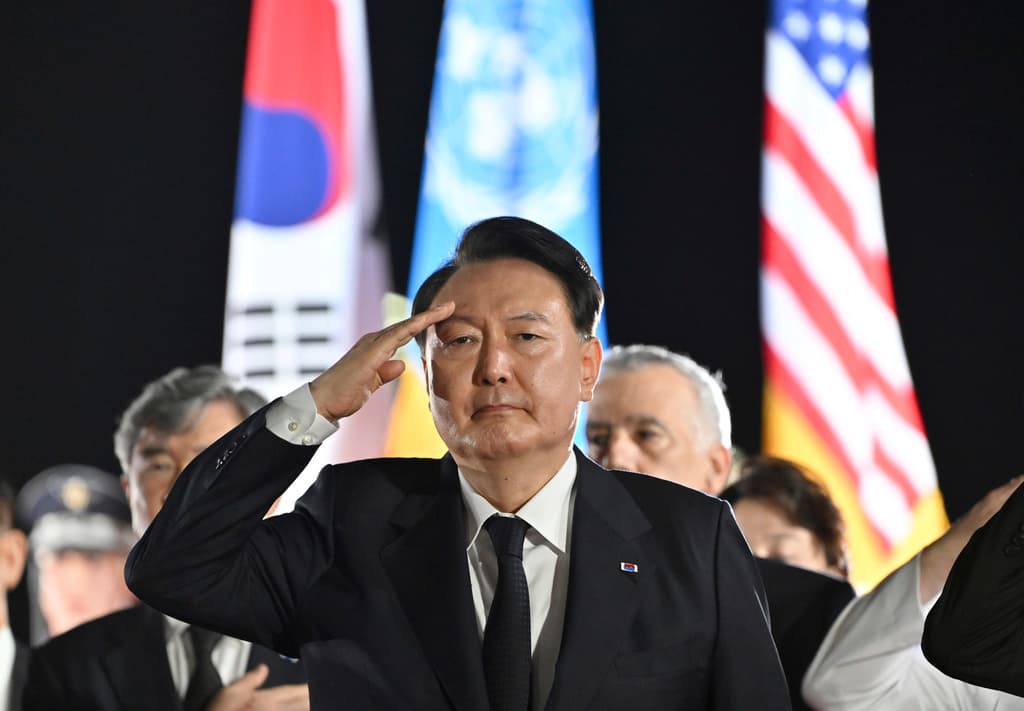South Korea Edges Closer to Status as Full-Fledged Nuclear Power
A strengthened pact, amid outrage at Moscow and Beijing, is signed by Yank and South Korean officials.

South Korea is edging ever closer to the status of a full-fledged nuclear power in the wake of last week’s NATO summit at Washington and the signing by Yank and South Korea officials of a much strengthened “nuclear deterrence” pact.
Amid outraged responses from both Moscow and Beijing, President Yoon of South Korea says the American-Korean alliance is “nuclear-based.” That phrase means Seoul has Washington’s assurances of a nuclear response as needed whenever North Korea’s Kim Jong-un makes good on his mounting threats to attack the South.
Mr. Yoon isn’t saying South Korea is developing its own nukes — something Washington has long opposed — but is confident that “the U.S. will assign a special mission to its nuclear assets for the Korean Peninsula both in wartime and peacetime.” South Korea’s Yonhap News quotes him as claiming to be able to “respond swiftly and effectively to any kind of North Korean nuclear threat.”
Those bold words come after North Korea’s foreign ministry, responding to the statement issued by Presidents Biden and Yoon during the NATO summit, warned that “NATO’s strategy for ‘globalization,’ pursued by the U.S., may certainly bring the danger of a worldwide war.”
Hinting at the potential of its own nuclear warheads, Pyongyang’s Korean Central News Agency quotes the foreign ministry as saying that “a new force and mode of counteraction” was needed “to foil the U.S. attempt for expanded military bloc.”
That was a reference to the bond formed at the summit between the 32 member nations of the North Atlantic Treaty and the four Indo-Pacific countries — Japan, South Korea, Australia and New Zealand — whose leaders attended as observers.
The leaders whose countries are members of the North Atlantic Treaty Organization caused still more consternation in Beijing after issuing a final statement calling the People’s Republic of China a “decisive enabler” of the war in Ukraine, heaping scorn on the People’s Republic’s claims that it isn’t aiding the Russians militarily. The Chinese, they said, are shipping “dual-use materials, such as weapons components, equipment, and raw materials that serve as inputs for Russia’s defense sector.”
Since then the Communist Chinese and Russian propaganda machines have been keeping up a steady drumbeat of anti-American and anti-NATO denunciations.
“What the Anglo-American hegemon and its European vassal states want is to fortify their position in Ukraine,” said a commentary in China’s English-language Global Times, accusing NATO of using the Ukrainian people “as a saber to weaken Russia.” Moscow’s view was much the same. A spokesman for President Putin said NATO had shown “its determination to remain an enemy for us.”
It was partly in response to a “comprehensive strategic partnership” signed in Pyongyang last month by Mr. Putin and Mr. Kim that Washington and Seoul upgraded their understanding on defense of the South under the longstanding American nuclear umbrella.South Korea, said Mr. Yoon, would “continue to strengthen the South Korea-U.S. alliance and also Korea-U.S.-Japan cooperation and the partnership with NATO to thwart and neutralize illicit Russia-North Korea military and economic cooperation.”

